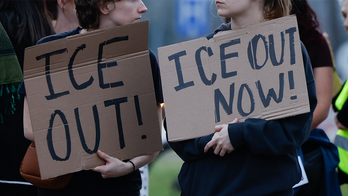BISMARCK, N.D. – Seven couples filed a federal lawsuit Friday challenging the constitutional prohibition on same-sex marriage in North Dakota, making it the last state in the country with a ban to be sued by gay couples seeking the right to wed in their home state. A federal judge also struck down Wisconsin's ban, ruling it was unconstitutional.
The North Dakota lawsuit, filed in federal court in Fargo, challenges both that state's ban on gay marriage and its refusal to recognize the marriages of same-sex couples who legally wed in other states.
That means cases are currently pending in all 31 states with gay marriage bans. Judges have overturned several state bans since the U.S. Supreme Court struck down part of the federal Defense of Marriage Act last year, with Wisconsin being the latest. Many of those rulings are being appealed, and Wisconsin Attorney General J.B. Van Hollen vowed to do the same.
Clerks in Madison and Milwaukee began issuing marriage licenses to same-sex couples soon after the ruling, despite confusion over the effect of the ruling. Van Hollen asked for an emergency court order halting gay marriages.
North Dakota's attorney general said he had not yet seen the lawsuit challenging the state's 2004 ban, which claims violations on three issues that are guaranteed in the 14th Amendment to the U.S. Constitution: equal protection, due process and right to travel.
"Ultimately, only the Supreme Court can determine whether North Dakota's enactment is constitutional or not," Attorney General Wayne Stenehjem said in a statement.
Legal experts said because North Dakota is the last state to face a lawsuit, a federal appeals court that covers the region or even the U.S. Supreme Court could rule on another case first, making the lawsuit largely symbolic given that all states with bans have now been challenged.
"It's symbolic, but sometimes symbolism is important, right? I think it has real, practical, actual effects on people nationwide and in North Dakota," said Carl Tobias, a professor at the University of Richmond School of Law.
Dale Carpenter, a professor at the University of Minnesota Law School, said it was already likely that the Supreme Court would take up the issue of same-sex marriages again this year, but the North Dakota lawsuit increases the possibility.
"They're not going to just wait around, because it's inevitably coming," Carpenter said. Rulings in the 4th and 10th Circuit Court of Appeals are expected in the coming months.
Gay couples already can wed in 19 states and the District of Columbia.
Chris Plante, a spokesman for the National Organization for Marriage, said the court rulings since last summer have created a distorted perception of public sentiment.
"This is not a wave of popular opinion that is being changed by any stretch of the imagination," he said. "This is simply a wave of justices who are legislating from the bench," he said.
Despite the uncertainty in Wisconsin over whether gay couples could immediately be given marriage licenses, Jose Fernando Gutierrez and Matthew Schreck married outside the county clerk's office in Milwaukee in what was possibly the first gay marriage in the state.
Andrew Warner, a minister at Plymouth Church in Milwaukee, married longtime partner Jay Edmundson, then performed a wedding for two members of his church, Christopher Martell and Mark Williams. Gutierrez and Schreck, who attend the same church, served as witnesses.
"I always felt like we were second-class citizens in not being able to get married," said Warner. "And now I feel good about my state in a way I haven't before."
Crabb's ruling declaring the 2006 law unconstitutional also asked the couples who sued to describe exactly what they wanted her to block in the law, then gave Van Hollen's office a chance to respond. She said she would later decide whether to put her underlying decision on hold while it is appealed.












































